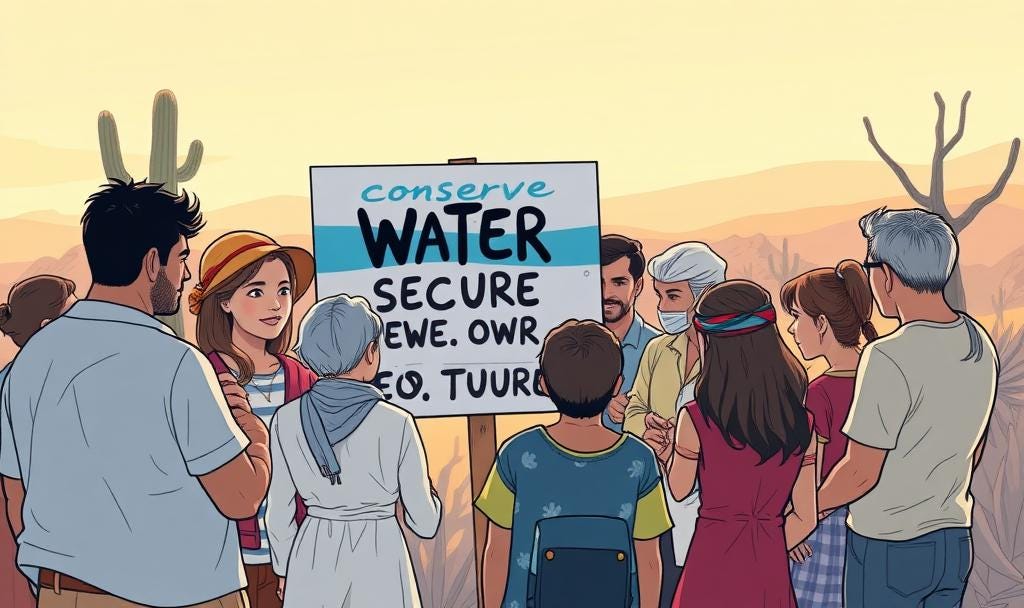💧 Arizona's Water Crisis 2025: Climate, Economy, and Survival in the Sonoran Desert
A Deep Dive into Arizona's Interconnected Environmental and Economic Challenges
Based on the 1/7/24 Buckmaster show on KVOI-1030AM.
🙊 Notable quotes from the show
"The facts may be facts, but perceptions become people's reality." - Dr. Jeff Silvertooth, discussing water management
"We have the luxury of a readily available food supply" - Dr. Silvertooth, challenging potential agricultural water restrictions
"High interest rates bleed through the economy in ways that people either don't understand or don't necessarily see" - Shelly Fishman, discussing economic challenges
😽 Keepin’ It Simple Summary for Younger Readers
👧🏾✊🏾👦🏾
💭🏜️🌞 Imagine a place where 💧 is super rare, and the ☀️ is getting hotter every year. In Arizona, scientists are worried 😟 because there's less water than ever before, making it harder to grow 🍅🌽 and keep people's 🏠 cool. The experts 🧑🔬 say we need to be really careful about how we use water 💦 and take care of our 🌍, or things could get really tough for everyone. 😰🌵
🗝️ Takeaways
🚰 Arizona loses 2 million acre-feet of water annually from the Colorado River
🌡️ December marked the third month of record high temperatures in Tucson
💸 The economy is projected to grow around 2% in 2025
🏘️ Housing market faces significant challenges due to high mortgage rates
🌱 Agriculture consumes 70% of Arizona's water, producing 800-1000 gallons per person daily
Climate, Capital, and Connectivity: Arizona's Precarious Crossroads
On Tuesday, January 7th, 2025, the Buckmaster Show, broadcasting on 1030 KVOI in Tucson, delivered another insightful episode exploring the intricate landscape of Arizona's economic and environmental challenges. Host Bill Buckmaster welcomed two prominent experts:
Dr. Dennis Hoffman, the esteemed director of the L. William Seidman Research Center at Arizona State University's W. P. Carey School of Busines
Dr. Jeff Silvertooth, a renowned University of Arizona agronomist and extension specialist
Financial advisor Shelly Fishman.
The show delved into critical issues facing Arizona and the nation, comprehensively analyzing economic projections, water resources, and the complex interplay between environmental sustainability and economic development.
Water: The Lifeblood of Survival
Dr. Jeff Silvertooth's testimony was nothing short of a clarion call. When he revealed that the Colorado River's annual flow has plummeted by 2 million acre-feet, it wasn't just a statistic—it was an indictment of our collective environmental negligence.
The fact that 70% of the United States is now experiencing drought conditions should shake us out of our complacency.
But here's where Silvertooth's expertise becomes revolutionary: He doesn't just diagnose the problem; he challenges our perceptions. "The facts may be facts, but perceptions become people's reality," he warned. In a state built on stolen Indigenous lands, where water rights have historically been a tool of colonization, this statement resonates deeply.
Agriculture uses 70% of our water, producing 800-1000 gallons per person daily. Instead of vilifying farmers, we must recognize the complex food production ecosystem. This isn't about restricting resources—it's about equitable and sustainable management.
Economic Uncertainty: Navigating Turbulent Waters
Dennis Hoffman and Shelly Fishman's economic analysis painted a nuanced picture of potential instability. With the return of the Trump administration, potential policy interventions like aggressive tariffs and immigration restrictions are clouding economic projections.
Hoffman's insights into withholding tax collections—up nearly 8%—suggest underlying economic resilience. Yet the real estate market tells a different story. Homeowners locked into 4% mortgages represent a microcosm of broader economic constraints, where systemic financial barriers restrict mobility.
Climate Justice: Beyond Local Boundaries
What emerged most powerfully was the interconnected nature of our environmental challenges. Silvertooth emphasized that drought isn't just an Arizona problem—it's a crisis in the Western United States and Northwest Mexico.
This transnational perspective is crucial. As the Indigenous peoples who have inhabited these lands for millennia understand, our environmental challenges don't respect artificial borders.
The Perception Paradox
Perhaps the most profound moment was Silvertooth's warning about the gap between facts and perception.
This is a critical intervention in an era of misinformation, where political rhetoric often trumps scientific evidence. We're not just fighting environmental degradation—we're battling a crisis of understanding.
Conclusion: Solidarity in Complexity
The Buckmaster Show reminded us that local journalism isn't just about reporting—it's about creating spaces for complex, nuanced dialogue. At the crossroads of environmental challenge, economic uncertainty, and cultural diversity in Arizona, we need precisely this kind of informed, compassionate analysis.
Our survival depends not on simplistic solutions but on recognizing our profound interconnectedness. Water, economics, and climate aren't separate issues. They're threads in the same fabric of our collective existence.
Stay informed. Stay engaged. Stay human.
👥 People Mentioned:
Bill Buckmaster
Radio show host
Host of the Buckmaster Show on 1030 KVOI
Known for in-depth local interviews
Dr. Dennis Hoffman
Director of Seidman Research Center at ASU
Memorable quote: Discussed how withholding tax collections are up 8% year-on-year
Economic expert providing insights into state and national economic trends
Dr. Jeff Silvertooth
University of Arizona agronomist
Expert on water resources and agricultural sustainability
Most memorable for his passionate defense of agricultural water use
Quote: "It takes between 800 and 1000 gallons of water to produce the food that we eat every day"
Shelly Fishman
Financial advisor and business consultant
Provided economic commentary
Predicted a "fairly okay year economically" for 2025
Donald Trump (mentioned in context of potential administration policies)
Discussed for potential economic impacts and tariff policies
President Biden (mentioned in economic comparisons)
Economic performance during his administration was briefly discussed







